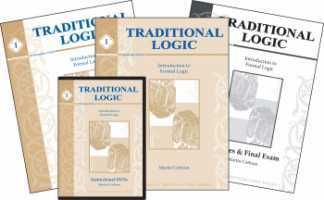

- DVD (see sample lesson here)
- 33 page book of Quizzes and Tests (see sample here)
- 56 page Teacher Key with all Student Book and Quiz/Test answers (see sample here)
- 146 page Student Book
Traditional Logic, formal logic (Aristotelian logic), teaches syllogisms, or deductive inference. It is differentiated from informal logic, or fallacies (straw man, ad-hominem, etc.). (N.B., there is also material logic, but few high school students would encounter it, I wouldn't think). Essentially, traditional logic is concerned with training the mind to see how truth conforms to reality. What? There is still such a thing as objective truth? Apparently so. One is immediately tempted to buy this course for every single college student in America who clearly missed the memo. But I digress.
The course is appropriate for a semester or a year's credit, and it is comprised of three parts in 14 chapters:
- Simple Apprehension (Term)
- Judgment (Proposition)
- Deductive Inference (Syllogism)
There is a Review and a Glossary of Terms.
How We Used It
I need to start right off by saying that this course is not easy. It is recommended for 7th grade and up, and that is definitely doable, but it is challenging. Martin Cothran, course presenter and author of the text, recognizes this fact, though, and offers an "out," as it were: by starting the course with Chapter 4, one avoids the more (I'm struggling to find the right word here) difficult/esoteric/abstract portion of the course. For my 7th grader, that was absolutely essential. Nicholas (12) already wasn't sold on the idea of doing logic, but he was my only option for this course. Therese (14) has already done logic, plus she doesn't have room in her schedule for this class. Nicholas (12) *desperately* needs an injection of logic into his world, plus I knew that a course like this would appeal to his overly black and white, completely literalistic approach to the world (broken record here: OCD/ADHD/Tourette's kid).
When we got the logic class, we put the DVD in the computer and began watching it (almost immediately switching to Chapter 4 when Mr. Cothran made that option available). Nicholas, as is his habit, took notes as he watched. I explained to him that the actual daily work required by the course was not onerous (he was pretty intimidated by the material that was being presented). So this is his Day 1 work:
While Nicholas has continued to use this program for the duration of the review period (although we have gone through the first test together orally, I didn't require that he complete it on his own), he has struggled with it. I am currently debating whether to have him finish it, with the possibility of having him revisit it again when the twins are a bit older, because I definitely want all three of my younger children to do it. As I indicated above, it is definitely doable for a 7th grader, particularly for an advanced 7th grader (and especially if that child has been pursuing a classical education already), but I think that Nicholas will get a lot more out of it in a couple of years. I still need to decide what to do.
Having said all of that, I can say with certainty that this program is a winner. It is an excellent first logic course, well-taught and well-executed. You don't need to have any prior logic knowledge to have your child do it, and your child will come out so far ahead of the game in terms of being able to understand how to engage the (increasingly more ludicrous) world around us with this course under his belt.
Memoria Press was, as always, super-generous with the Crew and sent products other than Logic as well, so be sure to click the banner below to see reviews on Astronomy and Greek Myths, too!



No comments:
Post a Comment